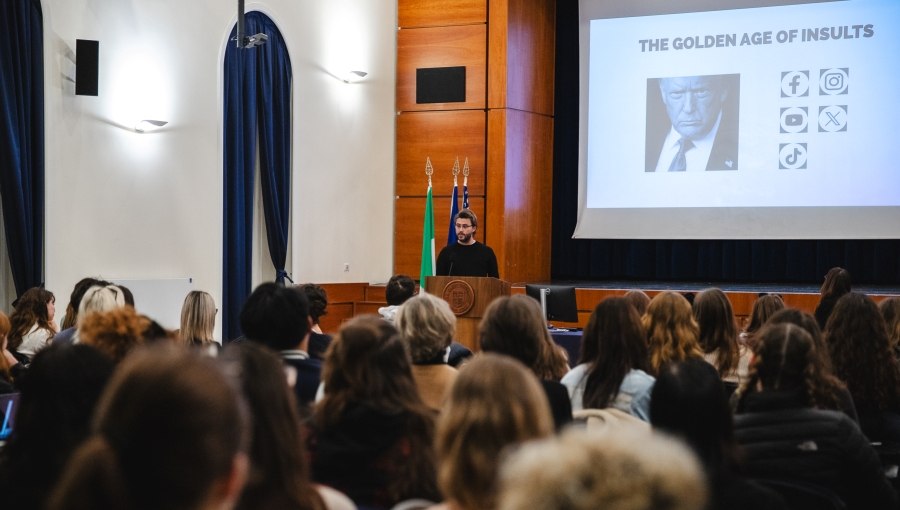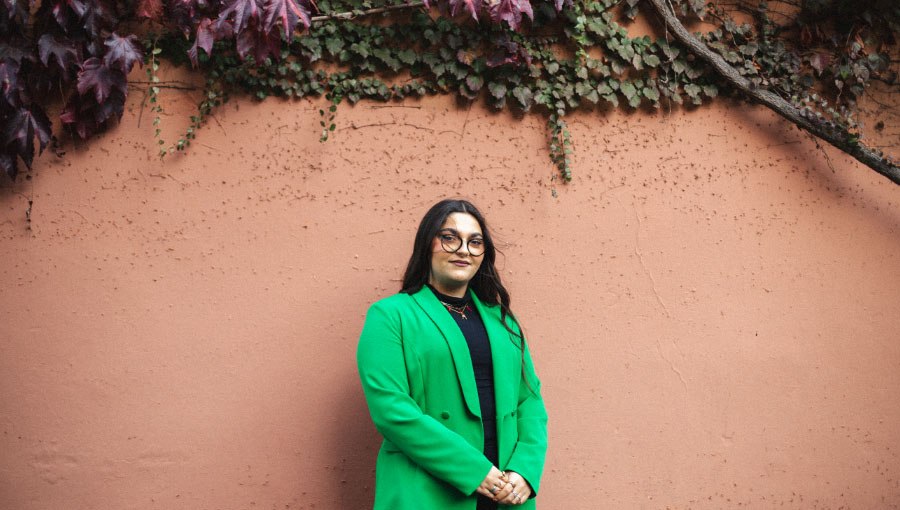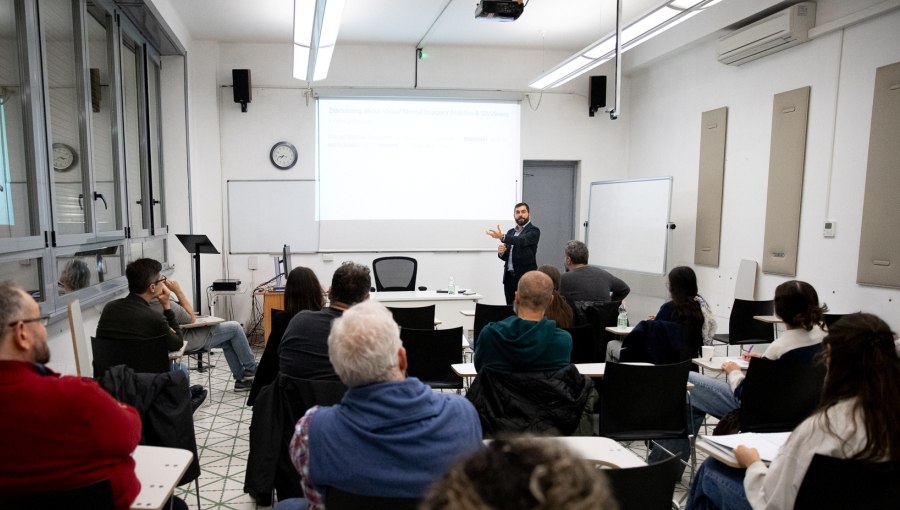Shaping Media Today: Alumna Maria Bondar
Maria Bondar, class of 2018, graduated with a degree in Communications and a minor in Psychology. Hailing from Ukraine, she completed an internship at the JCU Web Communications Office through the Career Services Center.
How’s life after graduation?
I am applying to master’s programs and jobs in communications and marketing. Social media management is the aspect I would like to focus on when obtaining my master’s degree and future career. What I like about it is that it requires a certain amount of creativity (e.g. writing catchy captions, creating effective graphics) but also some strategic thinking (e.g. determining what is the best way to target the audience.)
What brought you to JCU?
I used to visit Italy as a child because my mother’s husband is Italian. I liked the idea of moving to Rome but I wanted to find a university where classes are taught in English since I didn’t speak Italian yet. I researched it, and John Cabot University seemed to be exactly what I was looking for. The university’s international environment allowed me to find friends not only from my own Russian-speaking community but from all over the world. Besides, I was curious to try the American education system, mainly because of its curriculum flexibility. The fact that I could compose my own schedule and choose the professors and subjects really appealed to me.
What were your favorite courses in Communications and Psychology?
I was fortunate to take a lot of interesting courses with amazing professors here. I would say that my favorite Communications course was CMS 321 Contemporary Visual Culture, taught by Professor Mike Watson. As its name suggests, the course explores contemporary visual culture from a variety of angles: we went to contemporary art exhibits, discussed current political and social issues, studied the history of political and artistic movements, and even engaged in debates about popular icons such as Kim Kardashian or Rihanna. I also appreciated that the professor created a “safe” classroom environment for students to freely express their opinion.
As for psychology, I liked all the courses taught by Professor Paola Castelli. Her classes are extremely interesting, interactive, and very well organized. I also enjoyed taking PS 351 Health Psychology taught by Professor Nicola Petrocchi. I was impressed by how well he managed to integrate real psychology practice into a classroom setting. For example, sometimes we would start a class with a few minutes of meditation and couple of times, we had lectures focused on relaxation techniques. This is, in my opinion, a perfect balance between theory and practice.
Tell us about your thesis on “Capitalism in Dystopian Science Fiction Films.”
In some of my Communications courses, I studied how the capitalist system has been influencing the media to maintain its ideology. I was often exposed to popular opinions such as the idea that this is some kind of unstoppable phenomenon since the world is not likely to depart from capitalism. However, coming from an Eastern-European culture, I found this point of view rather limited to the Western world. Although the capitalist system is quite prevalent in the West, there are still some countries that do not adhere to it. I liked the controversy of this issue.
When choosing my thesis topic, my primary goal was to write about something relatively new, ideally a subject that the professor and the potential audience would be reading for the first time. Alternatives to capitalism, an under-researched topic, perfectly fit the criterion. When I was researching the topic, I discovered that dystopian science fiction films often contain scenarios that somehow critique the capitalist ideology. Some scholars argue that such films can be the first step in our re-thinking the current political system and seeking alternatives. My thesis explored the impact that dystopian sci-fi films can have on our political imagination.
What is your take on the role of media today?
Media is a very broad term. Some believe that media shapes us, others that we shape media. If you ask media theorists to explain the role of media today, most will probably tell you that media is influenced by the government or private corporations to promote their message or make a profit, but a few will also say that it’s a great instrument which can inform and unite the masses. I consider media both as a helpful tool that can often reveal information about the world and as a powerful means to misrepresent it and lure us into the trap of illusionary gratification.
I was part of a group project where we researched the use of Snapchat and Instagram among millennials. I investigated the psychological rewards users get from social media platforms (e.g. why do they post pictures? Why do they use certain hashtags?). The motives were surprisingly similar: acceptance, popularity, image crafting, etc. My conclusion was that these media platforms are often oriented towards satisfying our basic human need for approval. After this project, I noticed that my own use of social media decreased significantly because I realized that social media can serve as an instrument to play with our needs. Metaphorically speaking, as social media users, we seem like fish caught in a net, unable to escape from addictive applications on our phones.
The emergence of social media is one of the most studied phenomena today. Social networks are so embedded in our lives, and yet it seems like we still don’t know how to handle them. In my opinion, this is because no one could foresee the power of social media when it first appeared. The take-home message, however, is that while the media is sometimes seen as a scary brainwashing influencer, we shouldn’t forget that how we use it is actually up to us. We can either critically think about, study, and accept these global changes, or keep blaming the media for their inevitable occurrence.
Do you have any advice for graduating students?
I would say, start planning your course curriculum as early as you can. In this way, you will be able to complete your study program, and at the same time take courses that interest you but are not part of your major. Also, no matter how cliché it sounds, keep an open mind. For example, I did not enjoy writing before starting university, but after having written a great number of papers, I found myself appreciating it, to my great surprise. Finally, I strongly recommend taking advantage of the opportunity to study abroad. Going abroad gives you an invaluable experience, as you will meet new friends, discover different cultures, and make amazing memories.
Tell us about your professional experience while at JCU.
I appreciate that JCU contributes to both our educational as well as professional growth. During my senior year, I obtained a for-credit internship at the JCU Office of Web Communications through the university’s Center for Career Services. As a Web Communications Intern, I was involved in a variety of activities: covering events as a journalist or photographer, updating the website, working on Search Engine Optimization, editing articles, as well as working on video projects. This internship served as a reminder that communications is such a broad field! It was very invigorating to test my skills in different tasks. I realized that I enjoy creative activities (e.g. writing, editing, and photography) the most, and finally got an idea of what I could do in the future. Thanks to this internship, I became certain that I should continue my academic and career path in communications.






